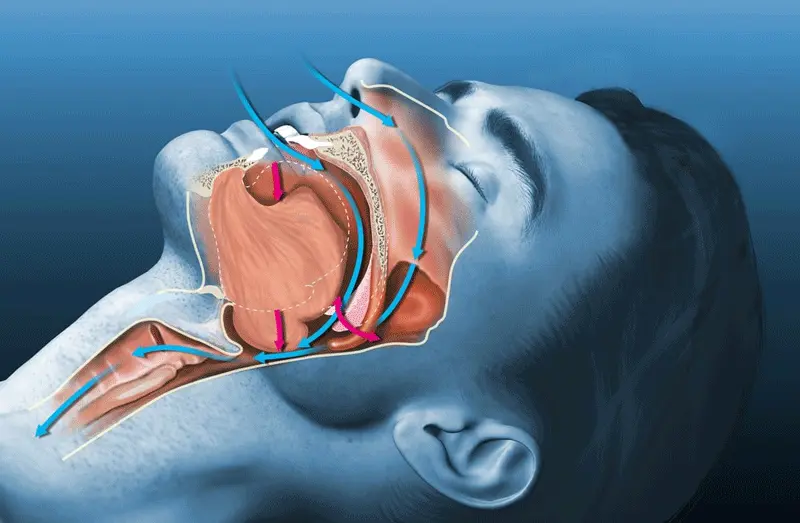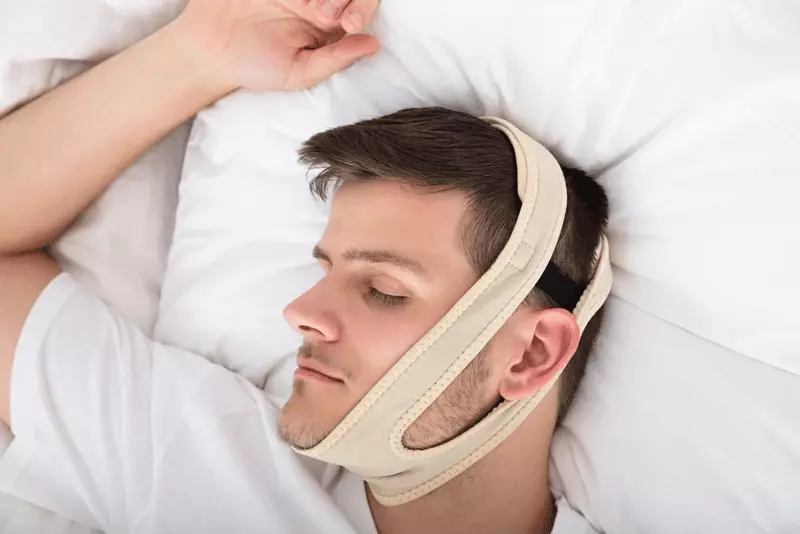Stop Snoring Now: Exercises to Help You Sleep Better
Jun 26th 2023
Imagine being on an idyllic beach, enjoying the relaxing rhythm of the waves when suddenly, the serenity is shattered by a thunderous snore arising from your beach towel - and it’s all yours. That's how many of us live, lurking as the unseen monsters under our own beds who sabotage our sleep night after night. But what if that could change? Get ready to toss aside those unhelpful nasal strips or awkward mouth guards. It’s time to discover exercises you can do right in your living room that can help banish snoring from your bedtime routine for good! Stop surrendering your sleep quality — this is your chance to take control back!
While there is no guarantee that any exercise will completely eliminate snoring, certain mouth and throat exercises may help improve muscle tone and reduce the frequency and noise of mild snoring. Some examples of effective exercises include the "gargle snore" and "tongue slide". However, it's important to note that not all types of snoring can be treated with exercises, and severe snoring may require medical intervention. It's always best to consult with a doctor before beginning any new exercise regimen.
Understanding the Causes of Snoring

Snoring is one of the most common sleep disturbances that affects millions of people around the world. However, not everyone who snores experiences the same severity or frequency of snoring. For some people, snoring may be a mild nuisance that they can easily live with, while for others, it can cause extreme discomfort and frustration. But what causes snoring in the first place? The answer is not straightforward, as there are various factors that can contribute to snoring.
One major reason why people snore is because their airway becomes partially blocked during sleep. This often happens when the muscles in the throat and tongue relax too much, and the soft tissues vibrate as air passes through them, resulting in the characteristic snoring sounds. Another common cause of snoring is obstructive sleep apnea (OSA), which is a more severe condition where breathing repeatedly stops and starts throughout the night due to an obstruction in the airway.
Research has shown that several other factors can also increase your risk of snoring or worsen your symptoms if you already snore. These include having a larger-than-average tongue or tonsils, being overweight or obese, consuming alcohol or sedatives before bed, smoking, allergies or sinus problems, and sleeping on your back.
For instance, John's wife had incessant complaints about his loud snores every night. After some observations and discussions with a doctor, she realized John's problem was because he was overweight and often consumed alcohol before going to bed. With a few lifestyle changes suggested by their doctor - John reduced his weight, stopped drinking alcohol before bed-time - his snoring became less frequent and less loud.
While occasional snoring may not pose any significant health risks, chronic or disruptive snoring can lead to daytime drowsiness, irritability, poor concentration, and even more severe medical conditions down the line.
Role of Jaw and Throat Muscles

Your jaw and throat muscles play a critical role in regulating your breathing during sleep, particularly when it comes to snoring. These muscles are responsible for keeping your airway open and preventing any blockages that may cause you to snore. However, if these muscles are weak or poorly toned, they can become lax during sleep and contribute to snoring.
Research has also suggested that individuals who have a thick and bulky neck with smaller airways tend to have weaker jaw muscle tone. This puts them at greater risk for snoring and sleep apnea.
For instance, Sarah was diagnosed with mild obstructive sleep apnea after she went to see her doctor because her husband could barely sleep due to her loud snoring. She was surprised when the doctor told her that her recent weight gain had weakened her jaw muscles making them too relaxed during sleep which caused the obstruction leading to OSA.
Fortunately, there are several exercises you can do that specifically target your jaw and throat muscles, helping them become stronger and more toned. These exercises can effectively reduce the occurrence of snoring, as well as improve the quality of your sleep overall.
One effective exercise is pushing the tip of your tongue gently against the back of your front teeth before sliding your tongue backward along the roof of your mouth. Repeat this process 20 times at night for better results.
Another exercise involves opening your mouth wide, then moving your jaw to one side while keeping your teeth clenched for some seconds. Move it to the other side and repeat it five times before bed-time every night.
It's essential to note that while exercises can help alleviate mild-to-moderate cases of snoring, they may not cure more severe cases of sleep apnea. In such instances, it's important to consult a medical professional for diagnosis and treatment options.
Impact of Tongue Position
Many people are unaware that the position of their tongue while sleeping can contribute to snoring. When the tongue falls back, it narrows the airway and causes vibrations during breathing, resulting in snoring. Proper tongue posture, on the other hand, helps keep the airway open and reduces snoring.
To understand this concept better, imagine a garden hose with water flowing through it. When you hold the hose straight without any kinks, water flows smoothly through it. However, when you bend the hose or put a kink in it, the water flow becomes obstructed and unpredictable. The same principle applies to our airway – proper tongue posture keeps the airway straight, allowing air to flow smoothly without causing any disturbances.
Studies have also shown that improving tongue position can lead to significant reductions in snoring. One study found that patients who underwent myofunctional therapy specifically targeting tongue position had a 50% reduction in snoring frequency and an 80% reduction in snoring intensity.
While some argue that simply keeping your tongue in a certain position might not be enough to stop severe snoring or sleep apnea, proper tongue posture can certainly help reduce mild to moderate symptoms.
Myofunctional Exercises: A Solution to Snoring
Myofunctional therapy is a set of exercises designed to strengthen the muscles of the mouth and throat, promote proper tongue posture and improve breathing habits. By practicing these exercises regularly, you can tone your muscles so that they work more efficiently during sleep, reducing instances of snoring.
Not only can these exercises reduce snoring frequency and intensity but they may also lead to better quality sleep for both you and your partner.
Here are a few examples of simple myofunctional exercises you can begin practicing today:
- Tongue Slide: With your mouth closed, slowly slide your tongue backward until it touches the back of your front teeth. Hold that position for a few seconds, then release.
- Swallow and Hold: Swallow with your tongue on the roof of your mouth. Hold the swallow for a couple of seconds before releasing.
- Snake: Open your mouth wide and touch your tongue to the roof of your mouth as far back as possible. Then lift it up towards the roof of the mouth while keeping it touching.
Studies have shown that myofunctional therapy can effectively reduce snoring and improve sleep quality. In one study, patients who underwent 12 weeks of myofunctional therapy experienced a 36% reduction in snoring frequency and a 31% reduction in daytime sleepiness.
Some may argue that these exercises are time-consuming or difficult to remember, but incorporating them into your daily routine can lead to long-term benefits that make the effort worthwhile.
While these exercises can be helpful for reducing snoring frequency and intensity, they are just one part of a comprehensive approach to combating snoring. In our next section, we will discuss lifestyle changes you can make to enhance your sleep even further.
- Myofunctional therapy is a set of exercises that can reduce snoring frequency and intensity while potentially leading to better quality sleep. By practicing simple exercises like Tongue Slide, Swallow and Hold, and Snake, you can tone your mouth and throat muscles to work more efficiently during sleep. Incorporating myofunctional therapy into your daily routine can have long-term benefits for snoring reduction and sleep quality improvement. While beneficial, these exercises should also be used alongside other lifestyle changes for a comprehensive approach to combating snoring.
Breathing Exercises for Better Sleep

If you're experiencing restless nights due to snoring, incorporating breathing exercises into your daily routine can be a natural and effective way to achieve better sleep. These exercises aim to improve muscle strength in the throat, promote proper breathing techniques, and reduce snoring frequency.
One effective breathing technique is known as pursed-lips breathing. To perform this exercise, inhale deeply through your nose and exhale slowly through your mouth, while keeping your lips pursed as if you were whistling. It's important to take deep breaths in between each exhale to ensure you're getting enough oxygen.
Another technique that has shown promising results is diaphragmatic breathing. This involves breathing from the diaphragm rather than from the chest. To practice this technique, lie down on your back with one hand on your chest and the other hand on your stomach. Take a deep breath in through your nose and focus on filling up your stomach with air. Exhale slowly through your mouth while contracting your stomach muscles.
One individual who struggled with snoring found relief through breathing exercises. After consistently practicing diaphragmatic breathing for several weeks, they noticed a significant reduction in snoring and improved sleep quality.
Research supports the effectiveness of these exercises as well. A study conducted by the American Journal of Respiratory and Critical Care Medicine found that participants who practiced diaphragmatic breathing experienced an improvement in oxygen saturation levels during sleep and a decrease in respiratory rate.
Think of these breathing exercises as training for a race - just like we train our muscles to prepare for a marathon, we can train our muscles to prevent snoring. With consistent practice, these techniques can become second nature and lead to better overall sleep.
Now let's explore some tongue and jaw exercises that can help alleviate snoring symptoms.
Tongue and Jaw Exercises for Snoring Relief

Aside from breathing exercises, tongue and jaw exercises can also be beneficial in reducing snoring. These exercises aim to strengthen the muscles in the throat and tongue, promoting proper tongue position and improving airflow.
One example of a tongue exercise is the "tongue slide". To perform this exercise, place the tip of your tongue behind your front teeth and slide it back along the roof of your mouth as far as you can without discomfort. Hold this position for a few seconds before relaxing the tongue back to its original position. Repeat this exercise several times.
Another helpful exercise is known as "jaw tension release". This involves clenching your jaw tight and holding for a few seconds before relaxing your jaw muscles. Repeat this exercise several times throughout the day to promote relaxation in the jaw muscles.
An individual who experienced frequent snoring found success with these exercises after consistently practicing them for several weeks. They noticed a reduction in snoring frequency and improved sleep quality.
Studies have also shown promising results. Research published in Otolaryngology - Head And Neck Surgery found that participants who practiced tongue exercises experienced a significant reduction in snoring severity and frequency compared to those who did not perform any exercises.
While these exercises can be effective, it's important to note that they may not work for everyone. In cases where snoring is caused by underlying medical conditions such as sleep apnea, medical intervention may be necessary.
Incorporating these mouth, throat, and breathing exercises into your daily routine, along with lifestyle changes such as maintaining a healthy diet and exercising regularly, can significantly improve snoring symptoms.
- According to a 2015 study in the American Journal of Respiratory and Critical Care Medicine, oropharyngeal exercises significantly reduced snore frequency by 36% and total snoring power by 59% after three months.
- Research indicates that regular practice of mouth and throat exercises (like gargling, tongue sliding) for at least 8-30 minutes a day can help reduce snoring in individuals with mild to moderate obstructive sleep apnea.
- A 2019 study found that participants following myofunctional therapy (a set of exercises designed to improve muscle strength in the face, mouth, and throat) for three months experienced a significant reduction in nighttime snoring-related sounds and improved sleep quality.
Lifestyle Changes to Enhance Your Sleep
When it comes to snoring, often the way we live can have a direct impact on how well we sleep. Making changes in our lifestyle can go a long way in improving our sleep quality overall.
One crucial step towards better sleep is establishing a regular sleep schedule. This means getting up and going to bed at the same time each day, even on weekends. By sticking to a routine, our body clock begins to identify patterns, making it easier for us to fall asleep more quickly and stay asleep for longer periods.

Additionally, eliminating habits such as smoking and drinking alcohol before bed has been linked to improved sleep quality. While it may feel like a glass of wine helps us unwind after a long day, research has shown that alcohol actually disrupts our natural sleep cycle, causing us to wake up during the night.

Some people use sleeping pills or medications to help them get better sleep at night. However, this isn’t always the best solution for everyone. While these medications might help someone sleep through the night, they can also cause side effects such as headaches and dizziness. Furthermore, some people may become reliant on these medications for better sleep, which could be dangerous in the long term.
Think of lifestyle changes as being like building blocks towards better sleep. There may be no instant fix or overnight solution, but slowly integrating these changes into your daily routine will lead you towards achieving better quality rest.
Diet, Exercise, and Sleep Hygiene

In addition to lifestyle changes that focus on building healthy routines around sleep schedules and habits that affect us at bedtime, there are other improvements we can make when it comes to diet and exercise.
If we’re eating a diet heavy in processed foods or sugary snacks throughout the day, these choices could be affecting our sleep quality later on. Eating a balanced diet that focuses on whole foods can help us feel more rested at night and support better overall health.
Incorporating healthy carbs into evening meals before bedtime can promote greater sleepiness and give us steady energy throughout the night. Whole grains like oats, quinoa, or brown rice are a good place to start.
Exercise is also key for overall health and wellbeing, helping us maintain a healthier weight and promoting feelings of relaxation. Some exercises like yoga and meditation have even been shown to calm the mind before bedtime, promoting deeper restful sleep.
One study found that doing aerobic exercises such as cycling or jogging for at least 30 minutes daily helped participants eliminate snoring altogether.
However, it’s important to not overdo it with exercise as well. Intense workouts late in the evening may actually cause more harm than good and make it harder for us to fall asleep.
Much like lifestyle changes, incorporating better eating habits and exercise routines take time to achieve real results. By taking small steps each day toward better nutrition, movement, and rest, we can make significant progress towards achieving deep and restful sleep on a regular basis.
Complementing Exercise with Anti-Snore Products

While myofunctional exercises can be tremendously helpful in reducing snoring, some people may require additional assistance to achieve the desired results. This is where anti-snore products come in. These products are designed to complement the effects of exercise by addressing specific causes of snoring. Some of the most popular anti-snore products available on the market include nasal dilators, chin straps, oral appliances, and CPAP machines.
Nasal Dilators: These small devices are inserted into the nostrils to help keep the airways open during sleep. They are particularly useful for those who suffer from congestion or nasal blockages due to allergies, a cold or flu.
Chin Straps: A chin strap is a simple device that wraps around the head and keeps the mouth closed while sleeping. It positions the jaw forward and prevents the tongue from falling back into the throat - both of which contribute to snoring.
Oral Appliances: Oral appliances are similar to mouthguards and work by repositioning the jaw, tongue and soft tissues in your mouth to allow more air to flow through your airway while you sleep. They’re custom-made by a dentist or sleep specialist, making them an effective option for people who have moderate to severe sleep apnea.
CPAP Machines: Continuous Positive Airway Pressure (CPAP) machines are often prescribed for patients with obstructive sleep apnea. The machine uses a mask that fits over the nose and/or mouth and creates positive pressure to keep the airway open throughout the night. While CPAP machines have been found to be highly effective, some find it uncomfortable as it may dry out their mouth or make noise.
Think of anti-snore products like tools in a toolbox - they can be used in conjunction with exercise to fix a problem. For instance, you wouldn’t try to hang a picture on the wall with just a hammer or a screwdriver; instead, you’d use both tools to get the job done right. Similarly, using anti-snore products alongside exercise can help address your individual snoring needs.
It’s essential to consult with a sleep specialist before attempting any kind of self-treatment. This is because snoring can be a symptom of an underlying condition such as sleep apnea, which requires medical attention. A sleep specialist will be able to determine if you require any further evaluation and recommend the most appropriate treatment for your individual needs.
Anti-snore products are an effective way to reduce snoring when used in conjunction with exercise, but it’s important not to rely solely on them. By adopting healthy lifestyle habits, like regular exercise and maintaining a healthy weight, avoiding alcohol consumption, and practicing good sleep hygiene, you can reduce your chance of snoring. Additionally, by combining myofunctional exercises with the right anti-snore products and lifestyle changes suggested by your healthcare provider, you should experience significant improvements in both your quality of sleep and overall health.
